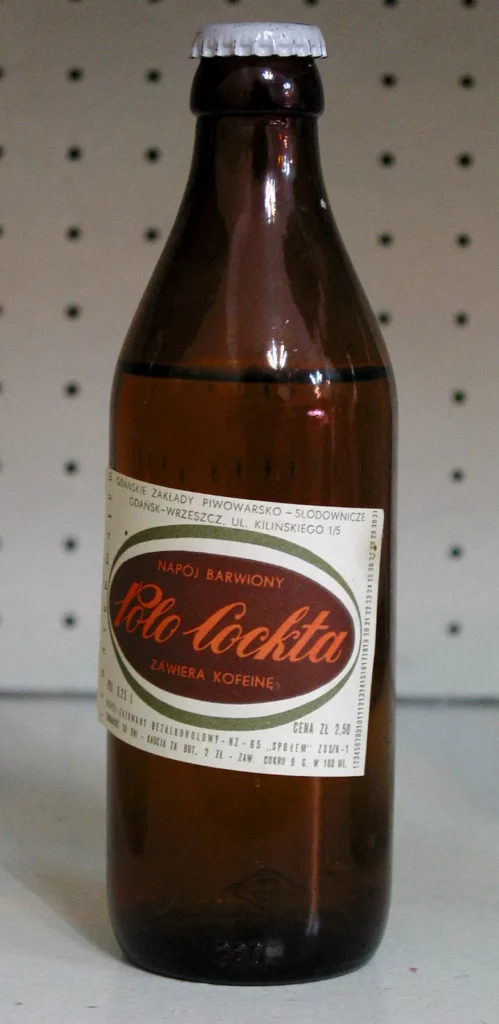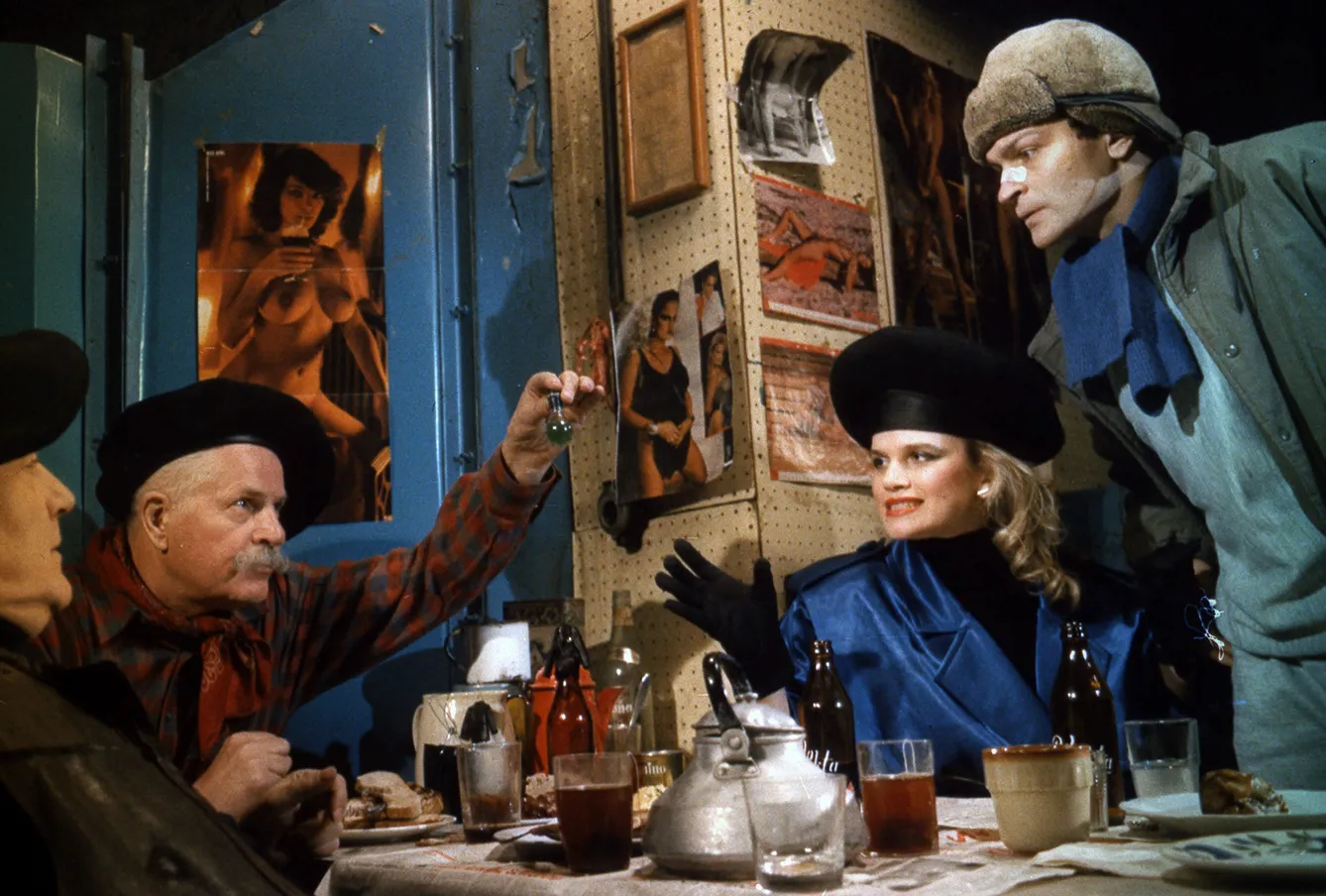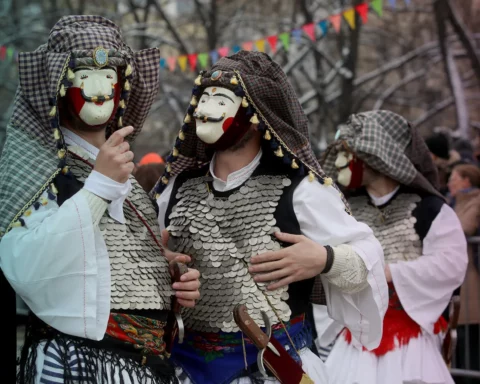During the Cold War, the mythical struggle was very much real, with both sides of the conflict, capitalist and socialist, fighting the war with symbols. And although for decades it was a trench war, with both sides fixed on their positions for a long time, there were areas of very kinetic conflict. One of them was soft drinks, where one symbol broke the socialist defense line and penetrated the socialist mir: cola.
Now, you say ‘socialist cola’, and I say Kofola – that’s the first possible association, as this Czechoslovakian soft dark herbal drink to this day is the most successful follower of Coca-Cola in Central Europe. But the Polish (as the name suggests) Polo Cockta had its moment in the late 1980s when it became a movie star.

The enemy tempts you with Coca-Cola
Now, let us clarify the “cock” part first: use Occam’s razor when looking for the pun. Most probably, the drink, introduced in Poland in the 1960s, had nothing to do with cock – neither male hen nor any other possible meaning of the word. Why the “k” then? Well, perhaps someone assumed that “cockta” looks more American, like “cocktail.” Or, even better, more directly hints as to how to read this unusual “American” word? Anyway, no COCKta joke remains as pun, as Polo Cockta is now (again) in (limited) distribution.
The need for a refreshing fizzy drink was fulfilled by “Społem” – state-run food cooperatives that were in charge of some of the food production and much of its distribution. And no, you can’t get a recipe, as there was none. There were local producers using available approximations of The Real Thing, with locally available bottles and labels.
Many variants of Polo-Cockta were heirs to earlier attempts at counterfeiting Coke – Cola-Cola, Extra-Cola, Polo-Cola, and the like.
All this said, it is hard to determine if Polo Cockta was A Thing – but obviously, as with Polish jeans manufacturer “Odra” – the laughable yet desired attempt at mimicking the West. Drinking Polo Cockta might have been fun, but then again – Coca-Cola remained a Socialist propaganda villain, with the slogan “The enemy tempts you with Coca-cola” remembered to this day as a symbol of this puny ideological effort.
The Polo-Cocktists on the loose
This is why, when in the early 1970s, the General Secretary of the Communist party, Edward Gierek, introduced Western soft drinks to Poland, the popularity of all national copies faded. Fun fact: Gierek oversaw the introduction of both Coca-Cola and Pepsi to Poland through the one and the same license holder, so for the first time in history, two competitors were under one umbrella corporation.
But was Polo-Cockta entirely forgotten? No, it wasn’t, and that’s thanks to art’s power to immortalize ideas. The time for Polo-Cockta came in 1987, when Juliusz Machulski made one of his most famous comedies – “Kingsajz.”
Kingsajz – the king size comedy
“Kingsajz” is of his immortal late-socialist movies disguising the weak and puny yet still totalitarian countries as different, strange worlds. Kingsajz is set in the Socialist Republic of Poland but with an extension to the underground world of… dwarves (or Lilliputes). The latter live in Drawerland (Szuflandia), a research lab’s basement archive, where they use archive cupboards as their dwellings.
Extremely creative in its set design, the movie uses oversized props and clever analog effects to paint a great caricature of the dystopian underworld, where the autocrat takes a steam bath in a kettle and rides a single skate as a gnome-drawn cart.
But why “Kingsajz” (or “King size,” spelled phonetically in Polish)? The movie suggests that in the Drawerland, everything is kept mediocre, so the limited resources (read: the products of the ineffective economy) are enough. But in the outer world – Communist Poland – everything is King Size (as in beds or cigarettes), so people tend to escape, using the enlarging potion.
But to keep the temporary effect of the potion, you need to drink… you guessed it, Polo-Cockta! As much of the action is focused on chasing the dissidents from Drawerland by the enlarged regime police, the rebels are – in Drawerland’s propaganda – called “The Polo-Cocktists.”
Sex mission, King size
Cinephile’s side note is in order here. Along with the 1987 Kingsajz, Juliusz Machulski directed the other similar film in 1984. Seksmisja [Sexmission] depicts the post-nuclear future where only women survived the apocalypse and inhabited their sophisticated underground dwellings in a strictly hierarchical society, trying to erase any mention of men’s input in the development of humanity.
Although the gendered discourse is strong with this one, both are usually recalled in one breath and interpreted as a political rather than any other kind of critique (although the interpretation of Sexmission may shift over time).
And both movies are a strong claim to fame for director Juliusz Machulski, who was back then in his early thirties. His light, fun, and very creative takes on late socialist Poland depicted it in new ways. Not as a grim, totalitarian world of political persecution nor propaganda-style milk-and-honey valley. It ridiculed communism as a weakening, fading background against which people lived their everyday lives. As such, it remains a shape-shifting image of Poland in the 1980s. Perhaps this was the only way for Polo-Cockta to survive?
An effort to reposition it in (late) capitalism was made by one of the major beverage manufacturers in Poland, but it failed so hard that it was rebranded as Polo Cola. After 2015, it was reintroduced again. But, based on street observation, moviegoers’ memory and the consumers’ palate are like two different countries.







